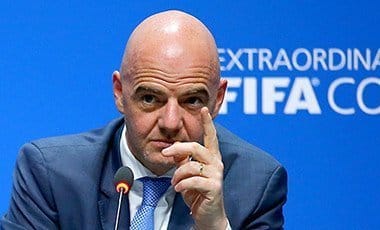FIFA, world football’s governing body, has criticised a decision by Swiss justice authorities to open criminal proceedings against its president Gianni Infantino as grotesque and absurd, swissinfo.ch reports.
“There is no factual basis whatsoever for this criminal investigation,” FIFA deputy general secretary Alasdair Bell told a news conference yesterday.
“There is no description of the criminal conduct of any kind that has been communicated to FIFA. There is something a little grotesque and unfair in all this because we are 100 per cent confident there will never be a criminal charge against the FIFA president,” he added.
The Swiss authorities said last Thursday that proceedings had been launched against the current FIFA boss by a special prosecutor looking into meetings he had with Swiss Attorney General Michael Lauber.
Both Lauber and Infantino have already denied wrongdoing.
“There is damage to both FIFA and the FIFA president simply because of the existence of this criminal investigation,” said Bell.
Last week, the watchdog body, which oversees the attorney general’s office, said that the special prosecutor had found indications of criminal conduct related to their meetings.
The proceedings concerned abuse of public office, breach of official secrecy, assisting offenders and “incitement to these acts”, it said.
“If someone opens a criminal investigation there needs to be a good reason and we don’t have any reasons,” said Bell. “There is no factual basis whatsoever for this criminal investigation.”
FIFA, which is based in Zurich, said that at the time of the meetings held in 2016 and 2017, the office of the attorney general was conducting investigations in more than 20 cases related to a scandal in which FIFA became embroiled before Infantino was elected president in 2016.
“You go to the most senior law officer in the country to offer information for a criminal investigation and then you end up being a subject of a criminal investigation yourself,” said Bell.
As for Lauber, he announced he would quit his post at the end of August amid strong criticism from parliamentarians.











